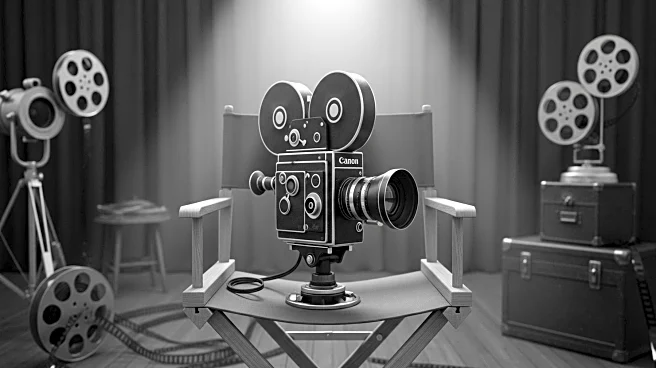What is the story about?
What's Happening?
Richard Linklater has released the trailer for his upcoming film 'Nouvelle Vague,' which pays homage to the making of Jean-Luc Godard's iconic 1959 film 'Breathless.' The movie, shot in black-and-white on 35mm film, stars Guillaume Marbeck as Jean-Luc Godard, Aubry Dullin as Jean-Paul Belmondo, and Zoey Deutch as Jean Seberg. The film explores Godard's early career as a film critic and his relationships with other New Wave filmmakers, including Francois Truffaut and Jacques Rivette. It also delves into his interactions with producer Georges de Beauregard and actress Jean Seberg. 'Nouvelle Vague' is set to be released theatrically in the U.S. on October 31 and will be available on Netflix U.S. starting November 14.
Why It's Important?
The release of 'Nouvelle Vague' highlights the enduring influence of the French New Wave movement on global cinema, particularly American filmmakers like Martin Scorsese and Quentin Tarantino. By revisiting the creation of 'Breathless,' Linklater's film offers insights into the innovative techniques and artistic collaborations that defined the era. This film could reignite interest in classic cinema and inspire contemporary filmmakers to explore similar creative approaches. Additionally, the film's release on Netflix expands its accessibility, allowing a wider audience to appreciate the historical significance of the New Wave movement.
What's Next?
Following the theatrical release, 'Nouvelle Vague' will be available on Netflix, potentially reaching a global audience and sparking discussions about the impact of the French New Wave on modern filmmaking. Film enthusiasts and critics may analyze Linklater's portrayal of Godard and his contemporaries, comparing it to historical accounts and previous cinematic interpretations. The film's reception could influence future projects that explore the lives and works of influential filmmakers.
Beyond the Headlines
Linklater's 'Nouvelle Vague' not only celebrates the artistic achievements of the French New Wave but also raises questions about the evolution of film criticism and production. By depicting Godard's challenges with producers and his unconventional methods, the film may prompt discussions about the balance between artistic vision and commercial viability in the film industry. Furthermore, the portrayal of Jean Seberg's relationship with Godard could shed light on gender dynamics in cinema during the late 1950s.















